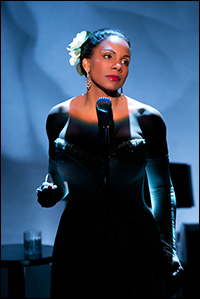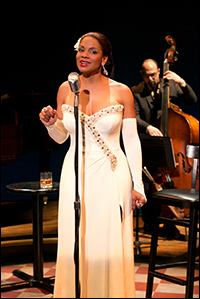
*
Audra McDonald made history June 8, when she took home her sixth Tony Award for her captivating portrayal of late jazz singer Billie Holiday in Lady Day at Emerson's Bar and Grill, the biographical play with music written by Lanie Robertson.
In the piece, which began Broadway performances March 25 at Circle in the Square and opened April 13, McDonald takes in her big voice to take on Holiday's classics. She interprets the tunes through the lens of a beaten-down Billie at a beaten-down bar in 1959 — a few months before her untimely death at the age of 44 on July 17, 1959.
McDonald funnels the late Lady Day through her performance, and brings Billie back to Broadway. We break down the Billie Holiday classics, performed by the six-time Tony winner (live at Broadway's Circle in the Square), here.
* "Introduction"
Shelton Becton as pianist Jimmy Powers introduces us to Billie Holiday in "Introduction." Audiences are immediately transported from Broadway's Circle in the Square (you can hear them applauding the entrance music 55 seconds in) to Philadelphia's Emerson's Bar & Grill. The audience settles in, and Audra McDonald as Holiday graces the stage to rapturous applause.
"I Wonder Where Our Love Has Gone"
As McDonald sings the first lyric, "All I know…" with a closed, small sound and jazz-inspired vibrato, we immediately forget the voice that won her previous Tony Awards for Carousel, Ragtime and Porgy and Bess, and we believe that the late, great Lady Day is back for one final performance. We love all of the shades McDonald has used to color Holiday — from the vibrato, to the drawl to the diction (listen to 18 seconds in, where "I know without your love" sounds like "I know without your lahhh").
"When a Woman Loves a Man"
Things pick up with the second tune, "When a Woman Loves a Man." McDonald's vocal choices, from the very beginning, are smart considering that playwright Lanie Robertson wrote in the Playbill (check it out at the Playbill Vault) that Holiday "stumbled in obviously 'quite high'…" She starts to speak-sing at around 25 seconds in, vocally falling off the end of phrases. McDonald's Holiday finishes strong at the two-minute mark. We love when she pops up on the word "loves" at 2:04.
 |
||
| Audra McDonald |
||
| Photo by Evgenia Eliseeva |
"Crazy He Calls Me"
Before "Crazy He Calls Me," Holiday explains that she has a contract to uphold to — she must sing crowd pleasers before she gets "too far juiced," so she goes into "Crazy She Calls Me," a song that was inducted into the Grammy Hall of Fame in 2010. In the midst of the song, she jokes that she will marry Jimmy once her next divorce is finalized. At that time, she was married to Louis McKay, her third husband who, although abusive, tried to get her off drugs. They were separated at the time of her death, and McDonald's inflections in this tune tug at the listener's heartstrings as she sings, "Crazy he calls me/Sure, I'm crazy/Crazy in love am I."
"Gimme a Pigfoot (and a Bottle of Beer)"
She continues to talk of her loves and loves lost, referencing her first husband Jimmy Monroe (aka Sonny), and has a conversation with the audience before asking Jimmy for a Bessie Smith number — she requests "Gimme a Pigfoot." McDonald takes liberties at 1:47, scatting her way through the end of the tune (in the next track she explains, "I'm not a blues singer like Bessie; I'm a jazz singer"), and then continues to tell the audience of how she enjoys to cook pigfoot. Listen to Billie Holiday's version of "Gimme a Pigfoot" on YouTube. "Baby Doll"
She continues with an impromptu version of Bessie Smith's "Baby Doll," asking Jimmy to find her a key for the 1926 tune. We love the back-and-forth dialogue that McDonald's Holiday is creating with her accompanist. At 42 seconds, she says, "Jimmy, scoot your ass on over, so I can sit down, too," before flawlessly continuing her performance. The full band joins in at 1:07, and her scoop on the last note at 1:55 is effortless.
"God Bless the Child"
"God Bless the Child" is one of Holiday's most famous and cherished tunes — her version was honored with the Grammy Hall of Fame Award in 1976 — and a song she wrote for "The Duchess," her mother Sadie Fagan. McDonald takes her time with "God Bless the Child" and delivers the first few verses as simply as possible. She makes use of her vibrato throughout the song and occasionally speak-sings the title lyrics, switching between performance and conversation with the audience in attempt to portray her story through song. The song picks up speed at 3:38, where McDonald brings it home to an audience hooting and hollering. Although there is no intermission in Lady Day at Emerson's Bar & Grill, this is where the first disc ends.
 |
||
| Audra McDonald |
||
| Photo by Evgenia Eliseeva |
"Easy Living"
"I'm not doing so good, Jimmy," Holiday begins before "Easy Living," a song suggested by Jimmy to try and bring her out of the depression she's fallen into. Shelton Becton as Jimmy Powers sings through most of the song, attempting to get McDonald to join in before she slurs the lyrics.
"Strange Fruit"
"Strange Fruit" is another of Holiday's most famous tunes, recorded in 1939, and McDonald's Holiday pulls herself together for a moving performance of the poem written by Abel Meeropol. She ends this song perfectly at 2:28, with, "Here is a strange and bitter crop." Obviously another crowd pleaser at Broadway's Circle in the Square, we can hear the audience applaud heavily for McDonald. "Blues Break"
When Holiday tells Jimmy, "It's bad again, Jimmy," she takes a break off stage, and we hear the band in "Blues Break." Shelton Becton sounds flawless on piano, and the band thrives here. (Steve Canyon Kennedy won the 2014 Tony Award for his sound design of Lady Day at Emerson's Bar & Grill.)
"'Tain't Nobody's Biz-ness If I Do"
McDonald returns to the stage with Roxie as her dog Pepi (cue the laughter and "aws" from the audience a few seconds into the song). It's obvious that she's done more drugs — she's slurring the words to this vaudeville blues standard, and in the show, she's returned with her white sleeve down to her wrist. Her voice is becoming a bit coarser in its lower register (listen at the two-minute mark), and she speaks through portions of the song.
"Don't Explain/What a Little Moonlight Can Do (Reprise)"
She begins "Don't Explain" a cappella and sings until she begins recklessly scatting at 1:30. When the song becomes incomprehensible, she stops and explains, "I want a beautiful home and some kids, and I want to cook… And, I want something else, too. I want a club. My own club. It's very small. It's very cozy, just some place where I can sing to all my friends. What else is there?"
"Deep Song"
She begins the somber "Deep Song," singing, "Lonely grief is hounding me/Like the lonely shadow hounding me/It's always there, just out of sight/Like a frightening dream on a lightening night." Her simple, broken-down performance is breathtaking — even via a live album — and the audience's applause is preserved on disc throughout McDonald's curtain call.
(Playbill.com staff writer Michael Gioia's work appears in the news, feature and video sections of Playbill.com as well as in the pages of Playbill magazine. Follow him on Twitter at @PlaybillMichael.)










